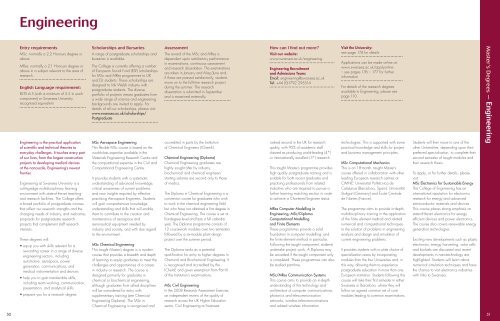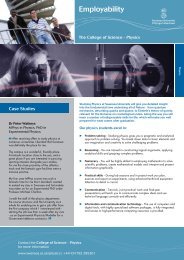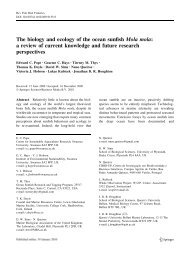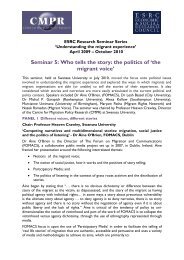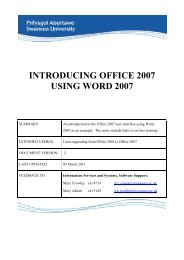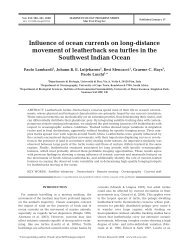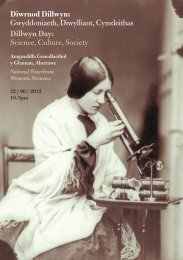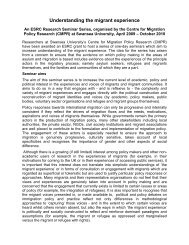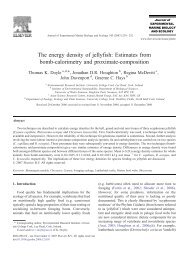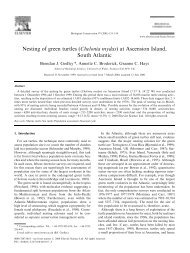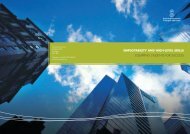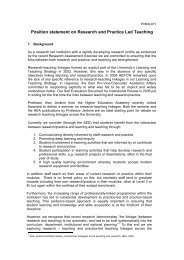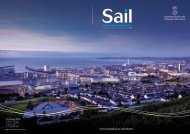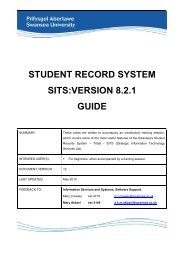Postgraduate Prospectus 2013 - Swansea University
Postgraduate Prospectus 2013 - Swansea University
Postgraduate Prospectus 2013 - Swansea University
You also want an ePaper? Increase the reach of your titles
YUMPU automatically turns print PDFs into web optimized ePapers that Google loves.
Engineering<br />
Entry requirements<br />
MSc: normally a 2.2 Honours degree or<br />
above<br />
MRes: normally a 2.1 Honours degree or<br />
above in a subject relevant to the area of<br />
research.<br />
English Language requirement:<br />
IELTS 6.5 (with a minimum of 5.5 in each<br />
component) or <strong>Swansea</strong> <strong>University</strong><br />
recognised equivalent.<br />
Engineering is the practical application<br />
of scientific and technical theories to<br />
everyday challenges. It touches every part<br />
of our lives, from the largest construction<br />
projects to developing medical devices<br />
at the nanoscale, Engineering’s newest<br />
frontier.<br />
Engineering at <strong>Swansea</strong> <strong>University</strong> is a<br />
cutting-edge multidisciplinary learning<br />
environment with state-of-the-art teaching<br />
and research facilities. The College offers<br />
a broad portfolio of postgraduate courses<br />
that reflect our research strengths and the<br />
changing needs of industry, and welcomes<br />
proposals for postgraduate research<br />
projects that complement staff research<br />
interests.<br />
These degrees will:<br />
• equip you with skills relevant for a<br />
rewarding career in a range of diverse<br />
engineering sectors, including<br />
automotive, aerospace, power<br />
generation, communications, and<br />
medical instrumentation and devices<br />
• help you to gain transferable skills,<br />
including team working, communication,<br />
presentation, and analytical skills<br />
• prepare you for a research degree.<br />
Scholarships and Bursaries<br />
A range of postgraduate scholarships and<br />
bursaries is available.<br />
The College is currently offering a number<br />
of European Social Fund (ESF) scholarships<br />
for MSc and MRes programmes to UK<br />
and EU students. These scholarships are<br />
designed to link Welsh industry with<br />
postgraduate students. The diverse<br />
portfolio of projects means graduates from<br />
a wide range of science and engineering<br />
backgrounds are invited to apply. For<br />
details of all our scholarships, please visit:<br />
www.swansea.ac.uk/scholarships/<br />
<strong>Postgraduate</strong><br />
MSc Aerospace Engineering<br />
This flexible MSc course is based on the<br />
world-class expertise available in the<br />
Materials Engineering Research Centre and<br />
the computational expertise in the Civil and<br />
Computational Engineering Centre.<br />
It provides students with a systematic<br />
understanding of advanced knowledge,<br />
critical awareness of current problems,<br />
and new insights required by effective<br />
practising Aerospace Engineers. Students<br />
will gain comprehensive knowledge,<br />
understanding and skills that will enable<br />
them to contribute to the creation and<br />
maintenance of aerospace and<br />
aeronautical equipment needed by<br />
industry and society, and with due regard<br />
to the environment.<br />
MSc Chemical Engineering<br />
This taught Master’s degree is a modern<br />
course that provides a breadth and depth<br />
of learning to equip graduates to meet the<br />
challenges and opportunities of a career<br />
in industry or research. The course is<br />
designed primarily for graduates in<br />
chemical or biochemical engineering,<br />
although graduates from allied disciplines<br />
will be considered for entry with<br />
supplementary training (see Chemical<br />
Engineering Diploma). The MSc in<br />
Chemical Engineering is recognised and<br />
Assessment<br />
The award of the MSc and MRes is<br />
dependent upon satisfactory performance<br />
in examinations, continuous assessment<br />
and research dissertation. The examinations<br />
are taken in January and May/June and,<br />
if these are passed satisfactorily, students<br />
move on to the full-time research project<br />
during the summer. The research<br />
dissertation is submitted in September<br />
and is examined externally.<br />
accredited in parts by the Institution<br />
of Chemical Engineers (IChemE).<br />
Chemical Engineering (Diploma)<br />
Chemical Engineering graduates are<br />
highly sought after by industry;<br />
biochemical and chemical engineers’<br />
starting salaries are second only to those<br />
of medics.<br />
The Diploma in Chemical Engineering is a<br />
conversion course for graduates who wish<br />
to work in the chemical engineering field<br />
but who have not obtained a first degree in<br />
Chemical Engineering. The course is set at<br />
first-degree level and lasts a full calendar<br />
year. The Diploma programme consists of<br />
12 coursework modules over two semesters<br />
followed by a six-module plant design<br />
project over the summer period.<br />
The Diploma ranks as a potential<br />
qualification for entry to higher degrees in<br />
Chemical and Biochemical Engineering. It<br />
is recognised and accredited by the<br />
IChemE and given exemption from Part III<br />
of the Institution’s examinations.<br />
MSc Civil Engineering<br />
In the 2008 Research Assessment Exercise,<br />
an independent review of the quality of<br />
research across the UK Higher Education<br />
sector, Civil Engineering at <strong>Swansea</strong><br />
How can I find out more?<br />
Visit our website:<br />
www.swansea.ac.uk/engineering<br />
Engineering Recruitment<br />
and Admissions Team:<br />
Email: engineering@swansea.ac.uk<br />
Tel: +44 (0)1792 295514<br />
ranked second in the UK for research<br />
quality, with 95% of academic staff<br />
classed as producing world-leading (4*)<br />
or internationally excellent (3*) research.<br />
This taught Master’s programme provides<br />
high quality postgraduate training and is<br />
suitable for both recent graduates and<br />
practising professionals from related<br />
industries who are required to pursue a<br />
further learning matching section in order<br />
to achieve a Chartered Engineer status.<br />
MRes Computer Modelling in<br />
Engineering; MSc/Diploma<br />
Computational Modelling<br />
and Finite Elements<br />
These programmes provide a solid<br />
foundation in computer modelling, and<br />
the finite element method in particular.<br />
Following the taught component, students<br />
undertake project work. A Diploma may<br />
be awarded if the taught component only<br />
is completed. These programmes can also<br />
be studied part-time.<br />
MSc/MRes Communication Systems<br />
This course aims to provide an in-depth<br />
understanding of the technology and<br />
architecture of computer communications,<br />
photonics and telecommunication<br />
networks, wireless telecommunications<br />
and related wireless information<br />
Visit the <strong>University</strong>:<br />
see page 174 for details<br />
Applications can be made online at:<br />
www.swansea.ac.uk/applyonline<br />
– see pages 176 – 177 for further<br />
information<br />
For details of the research degrees<br />
available in Engineering, please see<br />
page 110.<br />
technologies. This is supported with some<br />
practical knowledge and skills for project<br />
and business management principles.<br />
MSc Computational Mechanics<br />
This is an 18-month, taught Master’s<br />
course offered in collaboration with other<br />
leading European research centres at<br />
CIMNE: Universitat Politècnica de<br />
Catalunya (Barcelona, Spain), Universität<br />
Stuttgart (Germany) and École Centrale<br />
de Nantes (France).<br />
The programme aims to provide in-depth,<br />
multidisciplinary training in the application<br />
of the finite element method and related<br />
numerical and computational techniques<br />
to the solution of problems in engineering<br />
analysis and design and simulation of<br />
current engineering problems.<br />
It provides students with a wide choice of<br />
specialisation areas by incorporating<br />
modules from the four Universities and, in<br />
this way, allowing them to experience<br />
postgraduate education in more than one<br />
European institution. Students following this<br />
course will take their first semester in either<br />
<strong>Swansea</strong> or Barcelona, where they will<br />
follow an agreed common set of core<br />
modules leading to common examinations.<br />
Students will then move to one of the<br />
other Universities, depending upon their<br />
preferred specialisation, to complete their<br />
second semester of taught modules and<br />
their research thesis.<br />
To apply, or for further details, please<br />
visit<br />
MSc Electronics for Sustainable Energy<br />
The College of Engineering has an<br />
international reputation for electronics<br />
research for energy and advanced<br />
semiconductor materials and devices.<br />
This course places strong emphasis on<br />
state-of-the-art electronics for energy<br />
efficient devices and power electronics.<br />
The course also covers renewable energy<br />
generation technologies.<br />
Exciting new developments such as plastic<br />
electronics, energy harvesting, solar cells<br />
and biofuels are discussed and recent<br />
developments in nanotechnology are<br />
highlighted. Students will learn about<br />
numerical simulation techniques and have<br />
the chance to visit electronics industries<br />
with links to <strong>Swansea</strong>.<br />
Master’s Degrees – Engineering<br />
50<br />
51


